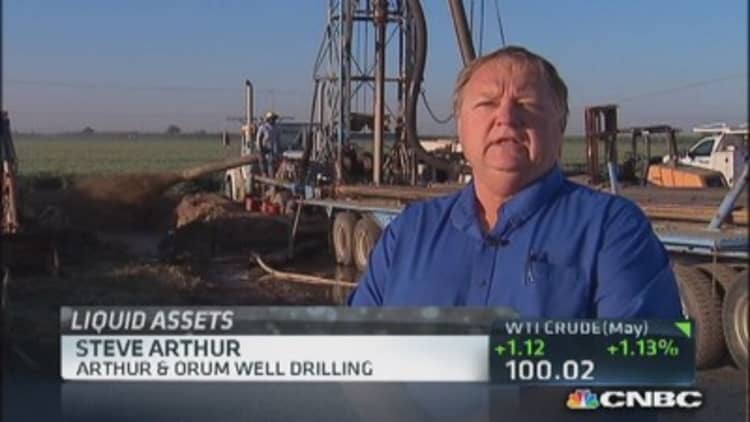The Golden State's current drought could be one for the history books, as farmers in the Central Valley are drilling deeper wells and dealing with a complete cutoff in contracted water from the state.
But at the southeastern corner of California, farmers have plenty of water.
"We are very blessed with the water we have," said Linsey Dale of the Imperial County Farm Bureau. She estimates the value of all the winter vegetables and alfalfa hay grown in this area north of the Mexican border are worth about $2 billion.
Where's the water coming from? A different source. Imperial County farmers get their water from the Colorado River, and they're close to the front of the line in receiving it.
One crop in particular, alfalfa hay, could be useful to California's cattle industry, which is currently paying high prices for feed due to a lack of rangeland hay.
(Read more: 'Growing discontent' among US farmers)
"The alfalfa business has been an excellent business for Imperial Valley farmers in the last five or six years," said grower Ronnie Leimgruber.
The only problem is a third of the alfalfa grown in Imperial County leaves California—in fact, it leaves the country.

"The export market is getting more and more stronger as our domestic market gets weaker," said Leimgruber. "The biggest customer for premium alfalfa hay is China."
(Read more: The best long-term real estate investment: Farmland)
As the drought progresses, Imperial County's bounty has led to grumbling in different parts of the Southwest. Some have even gone so far as to accuse farmers there of, in essence, exporting water the region could use.
"A hundred billion gallons of water per year is being exported in the form of alfalfa from California," Robert Glennon, a professor at the James E. Rogers College of Law at the University of Arizona, told the BBC, which claims it's now cheaper to send alfalfa from Los Angeles to Beijing via ship than to truck it from the Imperial Valley to the Central Valley.
That kind of talk rattles Leimgruber, who said the issue is not as cut-and-dried as the bales of hay bound for export.
"To say Imperial Valley is exporting the hay and is hurting the cattle industry in California ... is very simplistic," he said. "Generally, the rest of the state doesn't use the hay from Imperial Valley."
Two-thirds of local alfalfa stays in California, and, in any case, hay is often a crop grown close to its end market, he said. "Ask the general public, 'Would you rather have your water going to golf courses in Southern California and producing recreation for the top 6 percent of the population that plays golf, or would you rather have your water come to Imperial Valley, producing alfalfa hay, exporting to China and feeding the world?'"
There is also an element of either foresight or luck in this tale of two water supplies. Unlike Central Valley farmers who depend on an allotment of water from the Sacramento Delta and other sources facing competing priorities from cities and environmentalists, Imperial Valley farmers long ago locked in their Colorado River water, though they continue to fight to try to maintain those rights.
"Our forefathers were wise enough, back in the early days, to secure that water source," said the Farm Bureau's Dale. "We have no rainfall here in Imperial County, so we rely 100 percent on our supply from the Colorado River."
(Read more: Paying more at thepump? Blame ethanol prices!)
While the Imperial Valley seems immune to the water problems further north, the drought is having one impact on hay.
"The price has gone up because of the drought in California, no doubt about it," Leimgruber said. However, he becomes emotional at the thought of banning hay exports, pointing out that farmers in the Central Valley export their own products, like beef and almonds.
"We can stop exporting alfalfa tomorrow with the power of a pen," Leimgruber said, "and there will be a lot of people who will starve in the world if that happens, without a doubt."
—By CNBC's Jane Wells. Follow her on Twitter: @janewells.


